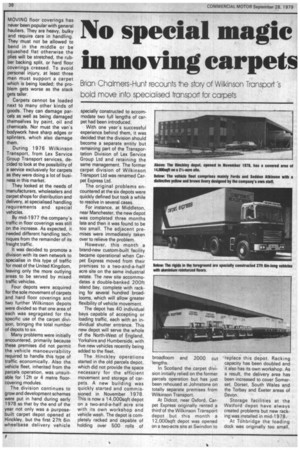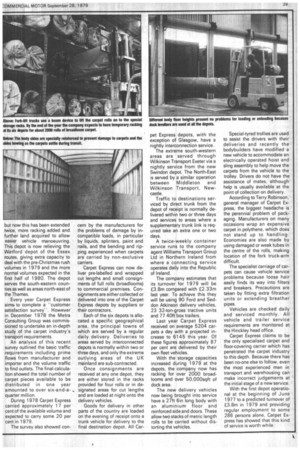No special magic in moving carpets
Page 40

Page 41

If you've noticed an error in this article please click here to report it so we can fix it.
Brian Chalmers-Hunt recounts the story of Wilkinson Transport "s bold move into specialised transport for carpets
MOVING floor coverings has never been popular with general hauliers. They are heavy, bulky and require care in handling. They must not be allowed to bend in the middle or be squashed flat otherwise the plies will be stretched, the rubber backing split, or hard floor coverings creased. To avoid personal injury, at least three men must support a carpet which is being loaded; the problem gets worse as the stack gets taller.
Carpets cannot be loaded next to many other kinds of goods. They can damage parcels as well as being damaged themselves by paint, oil and chemicals. Nor must the van's bodywork have sharp edges or splinters, which also damage them.
During 1976 Wilkinson Transport, from Lex Service Group Transport services, decided to look at the possibility of a service exclusively for carpets as they were doing a lot of business in this market.
They looked at the needs of -manufacturers, wholesalers and carpet shops for distribution and delivery, at specialised handling requirements and special vehicles.
By mid-1977 the company's traffic in floor coverings was still on the increase. As expected, it needed different handling techniques from the remainder of its freight traffic.
It was decided to promote a division with its own network to specialise in this type of traffic for most of the United Kingdom, leaving only the more outlying areas to be served by mixed traffic vehicles.
Four depots were acquired for the sole movement of carpets and hard floor coverings and two further Wilkinson depots were divided so that one area of each was segregated for the specific use of the carpet division, bringing the total number of depots to six.
Many problems were initially encountered, primarily because these premises did not permit the vehicle manoeuvrability required to handle this type of traffic economically. Also the vehicle fleet, inherited from the parcels operation, was unsuitable for 12ft or 4 metre floorcovering modules.
The division continues to grow and development schemes were put in hand during early 1978 so that by the end of the year not only was a purposebuilt carpet depot opened at Hinckley, but the first 27ft 6in wheelbase delivery vehicle specially constructed to accommodate two full lengths of carpet had been introduced.
With one year's successful experience behind them, it was decided that the division should become a separate entity but remaining part of the Transportation Division of Lex Service Group Ltd and retaining the same management. The former carpet division of Wilkinson Transport Ltd was renamed Carpet Express Ltd.
The original problems encountered at the six depots were quickly defined but took a while to resolve in several cases.
For instance, at Middleton, near Manchester, the new depot was completed three months late and then it was found to be too small. The adjacent premises were immediately taken over to relieve the problem.
However, this month a brand-new custom-built facility became operational when Carpet Express moved from their premises to a two-and-a-half acre site on the same industrial estate. The new site accommodates a double-banked 200ft island bay, complete with racking for several hundred broadlooms, which will allow greater flexibility of vehicle movement.
The depot has 40 individual bays capable of accepting or loading traffic, each with an individual shutter entrance. This new depot will serve the whole of the North-West of England, Yorkshire and Humberside, with five new vehicles recently being added to the fleet.
The Hinckley operations started in the old parcels depot, which did not provide the space necessary for the efficient movement and storage of carpets. A new building was quickly started and commissioned in November 1978. This is now a 14,000sqft depot on a two-and-a-half acre site with its own workshop and vehicle wash. The depot is completely racked and capable of holding over 500 rolls of broadloom and 2000 cut lengths.
In Scotland the carpet division initially relied on the former parcels operation but has just been rehoused at Johnstone on totally separate premises from Wilkinson Transport.
At Didcot, near Oxford, Carpet Express originally rented a third of the Wilkinson Transport depot but this month a 12,000sqft depot was opened on a two-acre site at Swindon to replace this depot. Racking capacity has been doubled and it also has its own workshop. As a result, the delivery area has been increased to cover Somerset, Dorset, South Wales and the Torbay and Exeter areas of Devon.
Storage facilities at the Watford depot have always created problems but new racking was installed in mid-1978.
At Tonbridge the loading dock was originally too small, but now this has been extended twice, more racking added and further land acquired to allow easier vehicle manoeuvring. This depot is now relieving the Watford depot of the Essex routes, giving extra capacity to deal with the pre-Christmas rush volumes in 1979 and the more normal volumes expected in the first half of 1980. The depot serves the south-eastern counties as well as areas north-east of the Thames.
Every year Carpet Express aims. to complete a "customer satisfaction survey—. However in December 1978 the Metra Consulting Group was commissioned to undertake an in-depth study of the carpet industry's transport requirements.
An analysis of this recent survey outlined the basic traffic requirements including prime flows from manufacturer and importer and the volume traffic to find outlets. The final calculation showed the total number of carpet pieces available to be distributed in one year amounted to over six-and-a_ quarter million.
During 1978 Carpet Express carried approximately 17 per cent of the available volume and expected to carry some 20 per cent in 1979 The survey also showed con cern by the manufacturers for the problems of damage by incompatible loads, in particular by liquids, splinters, paint and nails, and the bending and ripping experienced when carpets are carried by non-exclusive carriers.
Carpet Express can now deliver pre-labelled and wrapped cut lengths and small consignments of full rolls (broadlooms) to commercial premises. Consignments are either collected or delivered into one of the Carpet Express depots by suppliers or their contractors.
Each of the six depots is allocated a specific geographical area, the principal towns of which are served by a regular daily delivery. Deliveries to areas served by interconnected depots is normally within two or 'three days, and only the extreme outlying areas of the UK mainland are sub-contracted.
Once consignments are received at any one depot, they are either stored in the racks provided for four rolls or in designated areas for cut lengths and are loaded at night onto the delivery vehicles.
Goods for delivery in other parts of the country are loaded on the evening of receipt onto a trunk vehicle for delivery to the final destination depot. All Car pet Express depots, with the exception of Glasgow, have a nightly interconnection service.
The extreme south-western areas are served through Wilkinson Transport Exeter via a nightly service from the new Swindon depot. The North-East is served by a similar operation between Middleton and Wilkinson Transport, Newcastle.
Traffic to destinations serviced by direct trunk from the depot of receipt is normally delivered within two or three days and services to areas where a supplementary trunk link is required take an extra one or two days.
A twice-weekly container service runs to the company agent Williams Transport Group Ltd in Northern Ireland from where a connecting service operates daily into the Republic of Ireland.
The company estimates that its turnover for 1979 will be £3.8m compared with £2.33m last year. To achieve this they will be using 90 Ford and Seddon Atkinson delivery vehicles, 23 32-ton-gross tractive units and 77 40ft box trailers.
Last year Carpet Express received on average 5204 carpets a day with a projected increase to 6145 this year. Of these figures approximately 87 per cent are delivered by their own fleet vehicles.
With the storage capacities increased during 1979 at the depots, the company now has racking for over 2000 broadlooms and over 50,000sqft of dock area.
The new delivery vehicles now being brought into service have a 27ft 6in long body with an aluminium floor and reinforced side and doors. These allow two stacks of metric length rolls to be carried without distorting the vehicles. Special-tyred trollies are used to assist the drivers with their deliveries and recently the bodybuilders have modified a new vehicle to accommodate an electrically operated hoist and sling assembly to help move the carpets from the vehicle to the trolley. Drivers do not have the assistance of mates, although help is usually available at the point of collection on delivery.
According to Terry Robinson, general manager of Carpet Express, the biggest headache is the perennial problem of packaging. Manufacturers on many occasions wrap an expensive carpet in polythene, which does not stand up to handling. Economies are also made by using damaged or weak tubes in the centre of the rolls, making location of the fork truck-arm difficult.
The specialist carriage of carpets can cause vehicle service problems because loose hair easily finds its way into filters and breakers. Precautions are taken by fitting extra filtration units or extending breather pipes.
Vehicles are checked daily and serviced monthly. All vehicle and trailer service requirements are monitored at the Hinckley head office.
Carpet Express claims to be the only specialised carpet and floor-covering carrier which has penetrated the carpet industry to this depth. Because there has been no-one else to follow, even the most experienced men in transport and warehousing can make incorrect judgements at the initial stage of a new service.
With the first depot operational at the beginning of June 1977 to a predicted turnover of £3.8m in 1979 and providing regular employment to some 286 persons alone, Carpet Express has showed that this kind of service is worth while.




























































































































































